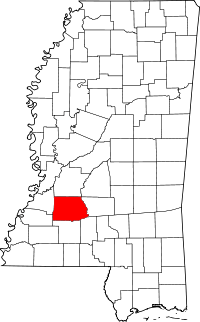Georgetown, Mississippi
Georgetown is a town in Copiah County, Mississippi, United States. The population was 286 at the 2010 census.[3] With its eastern border formed by the Pearl River, it is part of the Jackson Metropolitan Statistical Area.
Georgetown, Mississippi | |
|---|---|
 Location of Georgetown, Mississippi | |
 Georgetown, Mississippi Location in the United States | |
| Coordinates: 31°52′16″N 90°9′51″W | |
| Country | United States |
| State | Mississippi |
| County | Copiah |
| Area | |
| • Total | 0.68 sq mi (1.76 km2) |
| • Land | 0.67 sq mi (1.74 km2) |
| • Water | 0.01 sq mi (0.02 km2) |
| Elevation | 233 ft (71 m) |
| Population (2010) | |
| • Total | 286 |
| • Estimate (2019)[2] | 268 |
| • Density | 398.22/sq mi (153.86/km2) |
| Time zone | UTC-6 (Central (CST)) |
| • Summer (DST) | UTC-5 (CDT) |
| ZIP code | 39078 |
| Area code(s) | 601 |
| FIPS code | 28-26980 |
| GNIS feature ID | 0670358 |
Two sites near Georgetown are listed on the National Register of Historic Places: the Highway 28 bridge over the Pearl River, about a mile east of Georgetown, and the Alford-Little House, off Highway 27 south of town.
Geography
Georgetown is located in eastern Copiah County at 31°52′16″N 90°9′51″W. Mississippi Highway 28 leads west 14 miles (23 km) to Hazlehurst, the county seat, and east 29 miles (47 km) to Magee. Mississippi Highway 27 crosses Highway 28 on the northern edge of town and leads northwest 15 miles (24 km) to Crystal Springs and south 23 miles (37 km) to Monticello.
According to the United States Census Bureau, Georgetown has a total area of 0.69 square miles (1.8 km2), of which 0.008 square miles (0.02 km2), or 1.23%, is water.[3]
Demographics
| Historical population | |||
|---|---|---|---|
| Census | Pop. | %± | |
| 1920 | 317 | — | |
| 1930 | 303 | −4.4% | |
| 1940 | 415 | 37.0% | |
| 1950 | 327 | −21.2% | |
| 1960 | 285 | −12.8% | |
| 1970 | 339 | 18.9% | |
| 1980 | 343 | 1.2% | |
| 1990 | 332 | −3.2% | |
| 2000 | 344 | 3.6% | |
| 2010 | 286 | −16.9% | |
| Est. 2019 | 268 | [2] | −6.3% |
| U.S. Decennial Census[4] | |||
As of the census[5] of 2000, there were 344 people, 135 households, and 88 families residing in the town. The population density was 513.2 people per square mile (198.2/km2). There were 152 housing units at an average density of 226.8 per square mile (87.6/km2). The racial makeup of the town was 68.02% White, 29.94% African American, 0.87% from other races, and 1.16% from two or more races. Hispanic or Latino of any race were 1.74% of the population.
There were 135 households, out of which 34.1% had children under the age of 18 living with them, 40.7% were married couples living together, 19.3% had a female householder with no husband present, and 34.1% were non-families. 33.3% of all households were made up of individuals, and 10.4% had someone living alone who was 65 years of age or older. The average household size was 2.55 and the average family size was 3.27.
In the town, the population was spread out, with 29.9% under the age of 18, 8.1% from 18 to 24, 29.7% from 25 to 44, 20.9% from 45 to 64, and 11.3% who were 65 years of age or older. The median age was 35 years. For every 100 females, there were 90.1 males. For every 100 females age 18 and over, there were 81.2 males.
The median income for a household in the town was $25,781, and the median income for a family was $31,000. Males had a median income of $28,958 versus $20,313 for females. The per capita income for the town was $17,919. About 19.3% of families and 22.4% of the population were below the poverty line, including 26.0% of those under age 18 and 31.8% of those age 65 or over.
Education
Georgetown is served by the Copiah County School District.
The Copiah-Jefferson Regional Library operates a branch in Georgetown.[6]
Notable people
- Dick Bass, former American football running back who played for the Los Angeles Rams from 1960 to 1969[7]
- David Catchings Dickson, former Speaker of the Texas House of Representatives and fourth Lieutenant Governor of Texas[8]
References
- "2019 U.S. Gazetteer Files". United States Census Bureau. Retrieved July 26, 2020.
- "Population and Housing Unit Estimates". United States Census Bureau. May 24, 2020. Retrieved May 27, 2020.
- "Geographic Identifiers: 2010 Demographic Profile Data (G001): Georgetown town, Mississippi". U.S. Census Bureau, American Factfinder. Archived from the original on February 12, 2020. Retrieved October 7, 2014.
- "Census of Population and Housing". Census.gov. Retrieved June 4, 2015.
- "U.S. Census website". United States Census Bureau. Retrieved 2008-01-31.
- "Homepage". Copiah-Jefferson Regional Library. Retrieved 12 July 2014.
- "Dick Bass". databaseFootball.com. Archived from the original on June 21, 2013. Retrieved October 16, 2013.
- Erika L. Murr (1 September 2001). A Rebel Wife in Texas: The Diary and Letters of Elizabeth Scott Neblett, 1852--1864. LSU Press. p. 659. ISBN 978-0-8071-6646-8.
